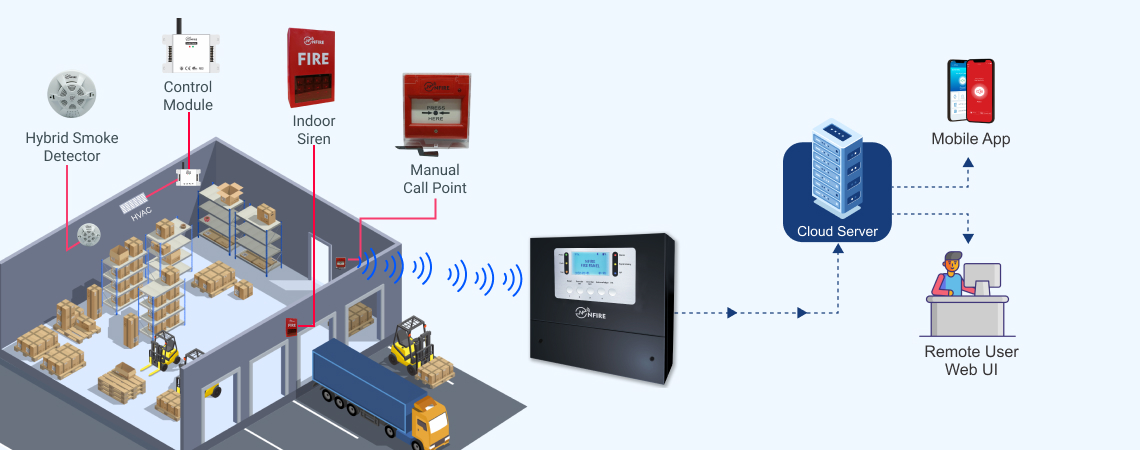Warehouses are critical hubs in the supply chain, storing vast amounts of goods that, if compromised by fire, can result in significant financial losses and disruptions. Traditional fire alarm systems, while effective, often struggle to provide the level of responsiveness and data-driven insight needed to protect these large, complex spaces fully. The integration of Internet of Things (IoT) technology into NFire fire alarm systems offers a revolutionary approach, enabling real-time monitoring, enhanced detection capabilities, and automated response mechanisms tailored to the unique needs of warehouses in India.

The vastness of warehouse spaces can delay fire detection if relying solely on traditional systems.
Warehouses often store a diverse range of materials, from flammable chemicals to valuable electronics, each with different fire risks.
Forklifts, electrical equipment, and other machinery can create potential fire hazards, particularly in high-traffic areas.
Given these challenges, IoT-based NFire fire alarm system is not just advantageous but necessary for comprehensive protection.
Smoke and Heat Sensors: These smart NFire sensors detect early signs of fire, such as smoke particles or rapid increases in temperature. IoT integration in NFire fire alarm system allows them to communicate with a central monitoring system, providing real-time data and enabling immediate response.
Environmental Sensors: These NFire sensors monitor conditions such as humidity, air quality, and the presence of hazardous gases, which can indicate fire risks or exacerbate fire situations.
Wireless Connectivity: IoT-enabled NFire fire alarm systems can communicate wirelessly across the warehouse, ensuring that all areas are covered without the need for extensive wiring, which is often impractical in large spaces.
Integrated Alerts: In the event of a fire, the NFire fire alarm systems can trigger alarms, notify warehouse personnel, and automatically contact emergency services. Alerts can also be sent to mobile devices using the NFire Connect mobile app, ensuring that all relevant parties are informed instantly.
Predictive Analytics: The NFire systems can analyze historical data and current conditions to predict potential fire risks, allowing for pre-emptive measures to be taken. For example, if a specific area of the warehouse consistently shows higher temperatures, it may indicate a malfunctioning piece of equipment that could start a fire.
Centralized Control: NFire cloud platform aggregates data from all connected devices, allowing for centralized monitoring and control. This platform can be accessed remotely via web UI and NFire Connect mobile app, providing flexibility for warehouse managers.
Fire Suppression Systems: In the event of a detected fire, the NFire Fire alarm system can automatically activate fire suppression systems such as sprinklers or gas-based suppression, targeting specific areas to minimize damage.
Evacuation Protocols: NFire fire alarm systems can integrate with building management systems to initiate evacuation procedures, guiding personnel to the safest exits based on real-time data.
IoT-based NFire fire alarm systems provide real-time data, enabling faster detection of fires compared to traditional systems. The immediate response can significantly reduce the time it takes to control and extinguish a fire, minimizing damage and potential downtime.
Traditional fire alarm systems can be prone to false alarms, which are not only disruptive but also costly. NFire systems, with their advanced sensors and data analytics, can differentiate between real fire risks and non-threatening anomalies, reducing the incidence of false alarms.
The NFire alarm systems ability to monitor conditions and issue real-time alerts ensures that warehouse personnel are informed of dangers as they arise. Automated evacuation protocols further enhance safety by directing employees away from danger zones.
The interconnectivity of IoT devices introduces potential cybersecurity risks. Hackers could potentially gain access to the fire alarm system, leading to false alarms or disabling the system entirely. NFire fire alarm systems implement a robust cybersecurity measure, such as military grade encryption AES256 and TLS 2.0 transport layer encryption, essential to protect the system.
The initial cost of installing an IoT-based fire alarm system can be higher than traditional systems due to the need for advanced sensors, wireless networks, and cloud-based monitoring platforms. However, the long-term benefits, including reduced downtime, fewer false alarms, and enhanced safety, often justify the investment.
Integrating an IoT-based NFire fire alarm system with existing warehouse management systems and fire suppression equipment can be achieved by control and monitoring units.
Warehouses often operate in environments that can be harsh, with fluctuating temperatures, high dust levels, and heavy machinery. NFire sensors and devices can withstand these conditions which is critical for maintaining system reliability.
Wireless hybrid sensors: Deployed throughout the warehouse to monitor for high temperatures and smoke, which could interfere with traditional fire detection methods.
Wireless Flash Sirens: Installed in key areas, these flash sirens were connected to a NFire fire alarm panel wirelessly. The siren had an inbuilt rechargeable battery back for extended uptime even in case of power outage.
Automated Fire Suppression: The system was integrated with existing sprinkler systems, enabling targeted activation in the event of a fire, which minimized water damage to stored goods.
Mobile Alerts: Warehouse managers and safety personnel received instant notifications via NFire connect mobile apps, allowing them to respond swiftly to any incidents.
As a result of this implementation, the warehouse experienced a significant reduction in false alarms, faster response times to actual fire risks, and improved overall safety for both personnel and inventory.
Implementing an IoT-based NFire fire alarm system in warehouses represents a significant advancement in fire safety. By leveraging real-time data, advanced sensors, and automated response mechanisms, these systems provide a level of protection that traditional fire alarm systems cannot match. While there are challenges with the traditional fire alarm systems, the benefits in terms of enhanced detection, operational efficiency, and safety make IoT-based NFire fire alarm systems a wise investment for modern warehouses in India. As technology continues to evolve, the role of IoT in warehouse fire safety in India is likely to become even more integral, paving the way for smarter, safer storage solutions.
To know more about how NFire’s IoT-based fire alarm systems can help secure warehouse.